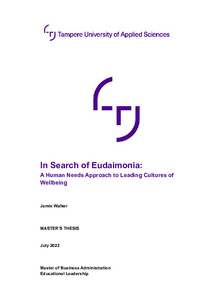In search of eudaimonia : a human needs approach to leading cultures of wellbeing
Walker, Jamie (2022)
Julkaisun pysyvä osoite on
https://urn.fi/URN:NBN:fi:amk-2022100520863
https://urn.fi/URN:NBN:fi:amk-2022100520863
Tiivistelmä
Driven by its mission and principles of learning, an International School in São Paulo, Brazil has undergone a change agenda to become a ‘culture of learning’. Renovations, alongside the construction of a purpose-built School have taken place, designed with learner-led, participatory pedagogy in mind. The physical environment is mirrored in the architecture of time, with the school timetable remodelled into a series of 90 minute blocks of time to promote inquiry-based learning.
The school has also adapted its treatment of wellbeing. This has been most apparent in the provision of three ‘wellness days’ per semester for staff, first introduced to help staff manage the disorientation caused by the Covid-19 pandemic. The school seeks to build upon these changes so that ‘flourishing’ and ‘fulfilment’ become cornerstones of individual and community operating culture.
Commitment to wellbeing is a cultural imperative to achieve this. The theoretical framework of this thesis introduces different conceptualisations of the term wellbeing, connecting it to the Aristotelian concept of eudaimonia as well as to Manfred Max-Neef’s Matrix of Human Needs.
The thesis analyses how theories of Eudaimonic Wellbeing can be applied in an International School context. The author conducted quantitative research with 58 participants in the form of Donaldson, van Zyl, L & Donaldson’s (2022) PERMA+4 Framework questionnaire across various employee groups in the school. Results were combined in a mixed-methods manner with a series of qualitative interviews with nine participants using the author’s Workplace Wellbeing Scaffold (WWS).
Results show that staff experience varying degrees of eudaimonic wellness along the nine PERMA+4 dimensions, based on which section they work in and by length of service. The findings reveal that two of the PERMA+4 dimensions, Environment and Economic Security, are least positive amongst the sample group. Conversely, participants show strong Positive Emotions, Meaning, Engagement and Accomplishment.
Findings prove that a Human Needs wellbeing strategy is a valid means to improve the workplace wellbeing when used with quantitative diagnostic measures. By using the WWS as a means to investigate individual PERMA+4 results, identify unmet human needs and create actionable plans to satisfy those needs in the form of I-Statements, people are able to identify strategies to meet their unmet human needs, in turn improving their wellbeing. It is therefore recommended that leadership adopt a longitudinal quantitative approach to determining the wellbeing of staff, as well as to adopt the WWS to support individuals in improving their workplace wellbeing.
The school has also adapted its treatment of wellbeing. This has been most apparent in the provision of three ‘wellness days’ per semester for staff, first introduced to help staff manage the disorientation caused by the Covid-19 pandemic. The school seeks to build upon these changes so that ‘flourishing’ and ‘fulfilment’ become cornerstones of individual and community operating culture.
Commitment to wellbeing is a cultural imperative to achieve this. The theoretical framework of this thesis introduces different conceptualisations of the term wellbeing, connecting it to the Aristotelian concept of eudaimonia as well as to Manfred Max-Neef’s Matrix of Human Needs.
The thesis analyses how theories of Eudaimonic Wellbeing can be applied in an International School context. The author conducted quantitative research with 58 participants in the form of Donaldson, van Zyl, L & Donaldson’s (2022) PERMA+4 Framework questionnaire across various employee groups in the school. Results were combined in a mixed-methods manner with a series of qualitative interviews with nine participants using the author’s Workplace Wellbeing Scaffold (WWS).
Results show that staff experience varying degrees of eudaimonic wellness along the nine PERMA+4 dimensions, based on which section they work in and by length of service. The findings reveal that two of the PERMA+4 dimensions, Environment and Economic Security, are least positive amongst the sample group. Conversely, participants show strong Positive Emotions, Meaning, Engagement and Accomplishment.
Findings prove that a Human Needs wellbeing strategy is a valid means to improve the workplace wellbeing when used with quantitative diagnostic measures. By using the WWS as a means to investigate individual PERMA+4 results, identify unmet human needs and create actionable plans to satisfy those needs in the form of I-Statements, people are able to identify strategies to meet their unmet human needs, in turn improving their wellbeing. It is therefore recommended that leadership adopt a longitudinal quantitative approach to determining the wellbeing of staff, as well as to adopt the WWS to support individuals in improving their workplace wellbeing.
